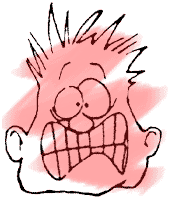Most every parent follows a very obvious pattern, when their child exhibits good behavior, they’re rewarded and when they exhibit bad behavior, they are punished.
The problem with this very basic concept is that it’s rarely ever balanced. In fact, many people fail to realize what a good balance even is. Rather than just suggest to you a percentage to try to achieve, I’d rather give you something else to think about… the consequences of each.
Rewards
Rewards are often thought of as candy, treats, ice cream, a present, video game time, etc… the idea is that your child earns something that they really enjoy for a job well done. What some people fail to realize is that there’s another form of positive reinforcement that has an even stronger and longer lasting effect: pride.
Your children think the world of you, even if it might not seem that way sometimes. In fact, I would argue that your child sees you the same way that a deeply devoted religious Christian sees God. Giver of life, provider of food and shelter, rewarder, punisher, etc… when you think of that level of devotion and admiration, you can see just how incredibly important you are in their lives.
As such, you could shower your child in their favorite candy & toys and still never get even a fraction of the way to how they would feel if you just show them how proud you are.
Punishments
Giving your child a timeout or grounding them is a great way to get the point across when your child does something wrong. The problem is that children are very adaptive and learn to cope with the things they come to expect often in their lives. We’ve all seen it happen in movies and stories, where even the worst case scenarios turn out poorly. A spanking parent or even one that outright beats their child as a constant punishment often loses their effect. The child toughens up and learns to just take it… making the punishment ineffective.
Much like rewards, the most effective punishment is to simply explain/demonstrate how disappointed you are in your child. This is what makes the time outs, groundings and even spankings effective at first. It’s a very clear way of showing your disgust with what they’ve done.
There’s a very real danger, however, of taking it too far. What often happens is that, as bad behaviors increase, the level of disappointment increases as well and parents find themselves saying outright hurtful things towards their own children. Many people think that children are more likely to stop a bad behavior the more they think that you’re embarrassed or disgusted by them. The truth is, however, that they’ll be more likely to repeat those behaviors.
After a while, they’ll begin to resent you, or worse… seek out those forms of attention as it’s the only form of attention they’ll get after a while.
The consequences of each
Why am I not splitting this up to discuss the consequences of rewards and the consequences of punishments? Well, the fact is that the consequences of each are the same.
Whether you reward your child with pride or punish your child with disgust, they will forever seek out more of it and it will have a lasting effect on your child’s self esteem for life.
I can’t put it any simpler than that. Your pride will empower your child to continue being a great person, to seek out more pride from everyone around them. Your disgust will act as a beat down on your child, making your child feel like they can never amount to anything, will constantly be a negative person around people and never living up to expectations.
It sounds harsh but think about your own childhood. I bet you can vividly remember times when your parents were very disappointed or even disgusted with you. That very strong emotional response doesn’t go away. It stays with you for life.
Those that can’t remember anything but disappointment and disgust don’t grow up to become rich and famous. There’s no incentive to work hard if they’ll only be met with more disgust. Losing jobs and failing at everything becomes so common that it becomes expected. It’s just how it’s always been. It’s a progression that leads to misery.
Those that are always encouraged continue to excel and do better than they had done previously, as they seek out more of that pride. When you’re proud of your child for learning letters, they try hard to learn how to put letters together to read, because they want you to be proud of them again. It’s a progression that leads to excellence if you nurture it enough.
So what is the balance?
There is no magical percentage to strive for when balancing out your rewards and punishments, but there is one way to achieve it without even putting in much effort. Follow this one simple step:
Don’t forget the pride!
The problem that most parents face when they do have a child that they need to punish often, or when they’re simply too busy every single day is that they forget to show their children the proper pride.
Keep saying “great job!” or “you’re awesome!” even if it’s just to celebrate the little things. Actually, it doesn’t even have to be in celebration of anything. I like to tell my boys how great they are as I tuck them into bed. I either just reinforce the positive or I remind them of the good things they did that day.
Every single time you show your child some pride, there’ll be one less time you’ll need to punish your child… they’ll continue to seek out the positive.
Autism
People with Autism are especially sensitive to this as memories can stay with them from as early as 1 year olds. Those with Autism often struggle through out their entire lives trying to understand what is it they do right and what they do wrong to warrant the reactions from others. Something they do wrong, and get a harsh reaction from their parents, may have been something that they thought they were doing right. This conflicting sense of right and wrong will stay with them for a long time, maybe even for ever.
So your punishment may be right, but the only thing your child takes from it is a life long sense of not ever knowing how to behave.
For those with Autism, you need to be very careful with your rewards and punishments. With every word you say, good or bad, keep in mind that it will be remembered forever, and will impact the rest of their lives.













